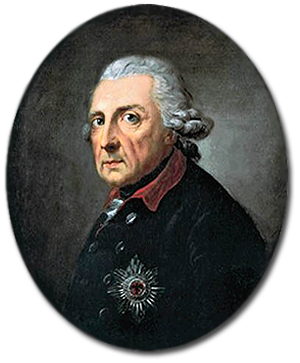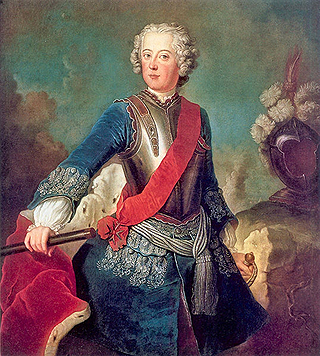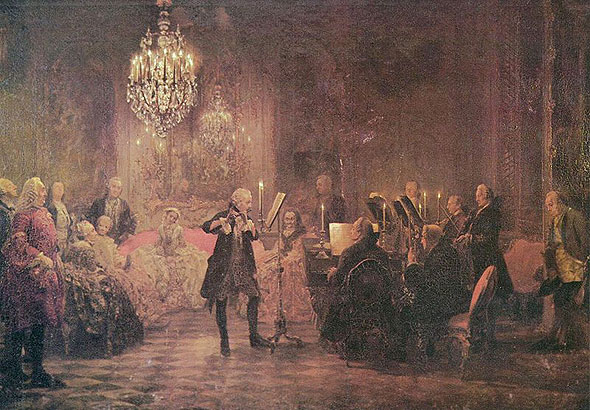Frederick the Great, Patron of the Arts
by Andrew Boyd
Today, what made Frederick great? The University of Houston's College of Engineering presents this series about the machines that make our civilization run, and the people whose ingenuity created them.

Frederick the Great earned the appellation "the Great" for much the same reason as many other historical figures: he was great at war and politics. Any history of Frederick justifiably focuses on his efforts to unite and empower Prussia. His military accomplishments were stunning. He was feared by his contemporaries; revered by generations of military strategists — Napoleon among them. But Frederick was more than a monarch-warrior. He was a man of the arts.
Born of the Enlightenment, Frederick was a close friend of  Voltaire and other luminaries of the time. He displayed unusual religious tolerance. He overhauled the legal system. He tolerated free expression of the press. He concerned himself with the welfare of common folk. This, he believed, was a king's duty. He didn't, however, even hint at anything like a democracy. In fact, during his reign, he consolidated the power of the monarchy. Frederick was enlightened, but he was still a despot.
Voltaire and other luminaries of the time. He displayed unusual religious tolerance. He overhauled the legal system. He tolerated free expression of the press. He concerned himself with the welfare of common folk. This, he believed, was a king's duty. He didn't, however, even hint at anything like a democracy. In fact, during his reign, he consolidated the power of the monarchy. Frederick was enlightened, but he was still a despot.
Frederick's love of music and poetry expressed itself in his teens — not what was expected of a king-to-be. It contributed to a break with his authoritarian father — a break that stripped the young Frederick of his military rank and led to the beheading of a close friend. But the event failed to squelch the young man's passion for the arts. Frederick played the flute, and during his life composed roughly one-hundred sonatas and a handful of symphonies for the instrument. That's remarkable. Imagine how we'd react today if a U.S. President took time out to compose a symphony or two.
During his time on the throne, Frederick surrounded himself with great musicians, artists, and thinkers. And it's here that we find a less celebrated reason for Frederick's greatness — as a patron of the arts.

The world's changed a lot since Frederick's time. There are no kings and queens to support the arts. They've been succeeded by foundations, corporations, and individuals who believe, as Frederick did, in the importance of the arts; in how much they enrich the human condition. Menil. Frick. Guggenheim. Just some of the twentieth century's great patrons — patrons who wrote big checks. But patronage can be as simple as paying to hear a concert, see a play, or wander through a museum. It may not be patronage on par with Frederick the Great, but it's certainly as noble.
I'm Andy Boyd at the University of Houston, where we're interested in the way inventive minds work.
(Theme music)
Frederick II of Prussia. From the Wikipedia web site: https://en.wikipedia.org/wiki/Frederick_II_of_Prussia. Accessed October 26, 2009.
G. MacDonogh. Frederick the Great: A Life in Deed and Letters. New York: St. Martin's Press, 2001.
All pictures are from Wikimedia Commons.